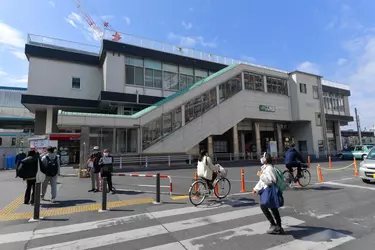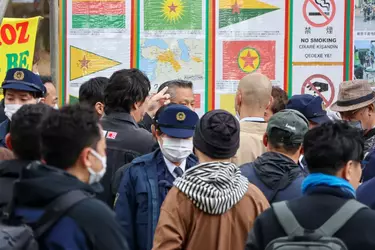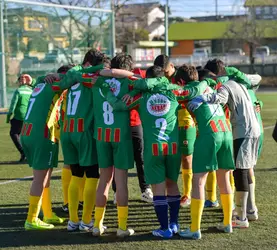KAWAGUCHI, Japan - For ethnic Kurds living in Japan, a smartphone camera turned in their direction is an unwanted reminder of the growing online hate aimed at their community.
At an apartment in eastern Japan, a cheerful, halting conversation in Japanese and Turkish, assisted by smartphone translation, unfolds between local supporters and the Kurdish family they are visiting.
Two women and four young children huddle in the space, while a middle school-aged boy, who appears not to be attending school, is in another room.
But the easy atmosphere, and the smiles on the women's faces, vanish into a pall of unease when a visitor's smartphone camera is turned toward them -- bringing back memories of the daily fear of being photographed or recorded without consent.
The cities of Kawaguchi and Warabi in southern Saitama Prefecture are home to many Kurds, an ethnic minority in the Middle East with a large number in Turkey. Warabi's particular concentration of foreign residents has earned it the nickname "Warabistan."

Photo shows the eastern side of Warabi Station, in Warabi, Saitama Prefecture, on March 2, 2025. (Kyodo)
Though the exact number is unknown, estimates place Japan's Kurdish population at around 2,000 to 3,000 people, some of whom do not have stable residency status.
Kurds have been settling in the area since the 1990s, with many working in the demolition industry doing the kind of difficult, dirty and dangerous work eschewed by many native Japanese.
But despite years of uneventful coexistence, since 2023 Japanese social media platforms have become a hotbed of hate spread about and toward the Kurdish community.
Claims often involve alleged crimes by Kurdish residents and accusations that fleeing Kurds are "fake refugees" exploiting one of the world's strictest asylum systems.
The undercurrent of hatred directed at them, along with the continual sense of surveillance in public, has left many Kurds struggling to overcome the feeling that Japan is hostile to their presence.
Posts online would suggest that Warabi's Kurdish presence is pronounced. But walking around the residential area near the station reveals that not to be the case.
Compared with other foreign residents, their numbers are small. And while online hearsay blames them for rising crime, official figures demonstrate it is largely baseless.

Undated photo shows demonstrators protesting the presence of Kurdish people in Japan in Kawaguchi, Saitama Prefecture. (Kyodo)
According to the Saitama prefectural police, arrests by foreign nationality in 2023 showed Vietnamese people made up the largest contingent at 417 people, followed by Chinese individuals at 234.
Turkish nationals, a group likely to include Kurds, accounted for 69 arrests and just 5.9 percent of the cases.
"There is a lot of commotion happening on social media badmouthing Kurds for crimes, but I don't feel that there has been an increase in the crimes exclusively committed by them," one police official said.
Mamo, 35, a Kurdish man who runs a real estate and demolition company, spoke about his experiences while sitting at Kawaguchi eatery Happy Kebab, an establishment that has become a hub for the Kurdish community. A permanent resident now married to a Japanese woman, he left his homeland for Japan in the 2000s after his family's land was seized.

Mamo describes his experiences as a Kurdish resident of Japan at Happy Kebab in Kawaguchi, Saitama Prefecture, on Jan. 28, 2025. (Kyodo)
"Hate speech has just become part of life, we're used to it now," reflected Mamo from a seat at the restaurant, which has a reputation for tasty kebabs and Kurdish food but has also become a target for anti-Kurdish demonstrators.
Kurdish people live in regions spanning Turkey, Syria, Iran and Iraq, often referred to as "the largest people without a country."
For many years, the Turkish government has pursued a policy of assimilation, forbidding the Kurds from using their language and engaging in their unique cultural practices.
Since the 1990s, when the oppression intensified, more and more Kurds fled to Japan, but the Japanese government has granted refugee status to very few, perhaps to maintain friendly relations with the Turkish government.
Trucks used by Kurdish demolition workers are a popular trope in online hate posts, referred to as illegal "Kurd cars." Users take pictures of the trucks piled high with scrap wood from demolitions.
"There are some people who load the trucks in strange ways, people who don't do it properly," conceded Mamo, who has worked in the industry for years. "But not everyone is like that -- and in some cases, the photos aren't even of Kurdish people's trucks."
Mamo said the community is less concerned about the vitriolic effect on adults, however. "It's different for the kids, for them it's traumatic to see people discriminating against them. We worry how it will affect them growing up."
In a bid to divert young Kurds' attention from hatred on screens to constructive pursuits, the community established FC Kurd, a soccer team of about 60 school kids from elementary to high school, in December 2024. It offers hope to Kurdish parents struggling to raise children in Japan.

A sample of the cuisine available at Happy Kebab in Kawaguchi, Saitama Prefecture, on March 2, 2025. (Kyodo)
Their coach, Metin, is a charismatic 51-year-old who fled to Japan two years ago. Formerly a professional footballer in Turkey, he later became deputy mayor of his hometown, only to be found guilty of using the Kurdish language in a public setting.
"We're showing how the kids can give their best to something in the face of this hate," Metin said at a training session for the team in a park outside Kawaguchi. A mix of Kurdish, Turkish and Japanese shouts could be heard from the sidelines.
Metin said the initiative has not insulated the community entirely from voyeuristic hate. "Recently, someone took photos of a bigger boy and posted it online with a caption that 'Kurds are fat.' Today, too, a man was taking photos without permission."
In early February, the boys donned their green and red jerseys to play their inaugural competitive match against a team that included members of the Rohingya stateless people, who face repression in Myanmar.

Members of Kurdish youth football team FC Kurd huddle during a match in Ibaraki Prefecture on Feb. 9, 2025. (Kyodo)
Despite a valiant effort, the Kurdish side lost 9-2. Organizers said it had been a start the team can build from, and they are planning for the future.
Vakkas Colak, head of the Japan Kurdish Cultural Association, has sought to improve ties between the Kurdish and wider Japanese communities since 2013. He says the onus is on Japan to make top-down changes.
Colak himself has been the target of online disinformation after posts claimed he said Japanese people should "die."
"There are people today who post hate to gain approval from society and stir up engagement. Some media outlets, perhaps to improve their sales, are creating an image of Kurds as bad people," the 43-year-old said in an interview at a restaurant in northern Tokyo.
Colak says the issue of online hatred toward Kurds is a symptom of a wider societal ill in Japan.
"The government must craft legislation that eliminates discrimination and disinformation. It's not a foreigners issue, it's an issue for the Japanese people as a whole. I want to see a change from Japanese society and its government," he said.
(Peter Masheter contributed to this report)
Article by Tomomi Akasaka and Keisuke Sunami (archive)
At an apartment in eastern Japan, a cheerful, halting conversation in Japanese and Turkish, assisted by smartphone translation, unfolds between local supporters and the Kurdish family they are visiting.
Two women and four young children huddle in the space, while a middle school-aged boy, who appears not to be attending school, is in another room.
But the easy atmosphere, and the smiles on the women's faces, vanish into a pall of unease when a visitor's smartphone camera is turned toward them -- bringing back memories of the daily fear of being photographed or recorded without consent.
The cities of Kawaguchi and Warabi in southern Saitama Prefecture are home to many Kurds, an ethnic minority in the Middle East with a large number in Turkey. Warabi's particular concentration of foreign residents has earned it the nickname "Warabistan."

Photo shows the eastern side of Warabi Station, in Warabi, Saitama Prefecture, on March 2, 2025. (Kyodo)
Though the exact number is unknown, estimates place Japan's Kurdish population at around 2,000 to 3,000 people, some of whom do not have stable residency status.
Kurds have been settling in the area since the 1990s, with many working in the demolition industry doing the kind of difficult, dirty and dangerous work eschewed by many native Japanese.
But despite years of uneventful coexistence, since 2023 Japanese social media platforms have become a hotbed of hate spread about and toward the Kurdish community.
Claims often involve alleged crimes by Kurdish residents and accusations that fleeing Kurds are "fake refugees" exploiting one of the world's strictest asylum systems.
The undercurrent of hatred directed at them, along with the continual sense of surveillance in public, has left many Kurds struggling to overcome the feeling that Japan is hostile to their presence.
Posts online would suggest that Warabi's Kurdish presence is pronounced. But walking around the residential area near the station reveals that not to be the case.
Compared with other foreign residents, their numbers are small. And while online hearsay blames them for rising crime, official figures demonstrate it is largely baseless.

Undated photo shows demonstrators protesting the presence of Kurdish people in Japan in Kawaguchi, Saitama Prefecture. (Kyodo)
According to the Saitama prefectural police, arrests by foreign nationality in 2023 showed Vietnamese people made up the largest contingent at 417 people, followed by Chinese individuals at 234.
Turkish nationals, a group likely to include Kurds, accounted for 69 arrests and just 5.9 percent of the cases.
"There is a lot of commotion happening on social media badmouthing Kurds for crimes, but I don't feel that there has been an increase in the crimes exclusively committed by them," one police official said.
Mamo, 35, a Kurdish man who runs a real estate and demolition company, spoke about his experiences while sitting at Kawaguchi eatery Happy Kebab, an establishment that has become a hub for the Kurdish community. A permanent resident now married to a Japanese woman, he left his homeland for Japan in the 2000s after his family's land was seized.

Mamo describes his experiences as a Kurdish resident of Japan at Happy Kebab in Kawaguchi, Saitama Prefecture, on Jan. 28, 2025. (Kyodo)
"Hate speech has just become part of life, we're used to it now," reflected Mamo from a seat at the restaurant, which has a reputation for tasty kebabs and Kurdish food but has also become a target for anti-Kurdish demonstrators.
Kurdish people live in regions spanning Turkey, Syria, Iran and Iraq, often referred to as "the largest people without a country."
For many years, the Turkish government has pursued a policy of assimilation, forbidding the Kurds from using their language and engaging in their unique cultural practices.
Since the 1990s, when the oppression intensified, more and more Kurds fled to Japan, but the Japanese government has granted refugee status to very few, perhaps to maintain friendly relations with the Turkish government.
Trucks used by Kurdish demolition workers are a popular trope in online hate posts, referred to as illegal "Kurd cars." Users take pictures of the trucks piled high with scrap wood from demolitions.
"There are some people who load the trucks in strange ways, people who don't do it properly," conceded Mamo, who has worked in the industry for years. "But not everyone is like that -- and in some cases, the photos aren't even of Kurdish people's trucks."
Mamo said the community is less concerned about the vitriolic effect on adults, however. "It's different for the kids, for them it's traumatic to see people discriminating against them. We worry how it will affect them growing up."
In a bid to divert young Kurds' attention from hatred on screens to constructive pursuits, the community established FC Kurd, a soccer team of about 60 school kids from elementary to high school, in December 2024. It offers hope to Kurdish parents struggling to raise children in Japan.

A sample of the cuisine available at Happy Kebab in Kawaguchi, Saitama Prefecture, on March 2, 2025. (Kyodo)
Their coach, Metin, is a charismatic 51-year-old who fled to Japan two years ago. Formerly a professional footballer in Turkey, he later became deputy mayor of his hometown, only to be found guilty of using the Kurdish language in a public setting.
"We're showing how the kids can give their best to something in the face of this hate," Metin said at a training session for the team in a park outside Kawaguchi. A mix of Kurdish, Turkish and Japanese shouts could be heard from the sidelines.
Metin said the initiative has not insulated the community entirely from voyeuristic hate. "Recently, someone took photos of a bigger boy and posted it online with a caption that 'Kurds are fat.' Today, too, a man was taking photos without permission."
In early February, the boys donned their green and red jerseys to play their inaugural competitive match against a team that included members of the Rohingya stateless people, who face repression in Myanmar.

Members of Kurdish youth football team FC Kurd huddle during a match in Ibaraki Prefecture on Feb. 9, 2025. (Kyodo)
Despite a valiant effort, the Kurdish side lost 9-2. Organizers said it had been a start the team can build from, and they are planning for the future.
Vakkas Colak, head of the Japan Kurdish Cultural Association, has sought to improve ties between the Kurdish and wider Japanese communities since 2013. He says the onus is on Japan to make top-down changes.
Colak himself has been the target of online disinformation after posts claimed he said Japanese people should "die."
"There are people today who post hate to gain approval from society and stir up engagement. Some media outlets, perhaps to improve their sales, are creating an image of Kurds as bad people," the 43-year-old said in an interview at a restaurant in northern Tokyo.
Colak says the issue of online hatred toward Kurds is a symptom of a wider societal ill in Japan.
"The government must craft legislation that eliminates discrimination and disinformation. It's not a foreigners issue, it's an issue for the Japanese people as a whole. I want to see a change from Japanese society and its government," he said.
(Peter Masheter contributed to this report)
Article by Tomomi Akasaka and Keisuke Sunami (archive)